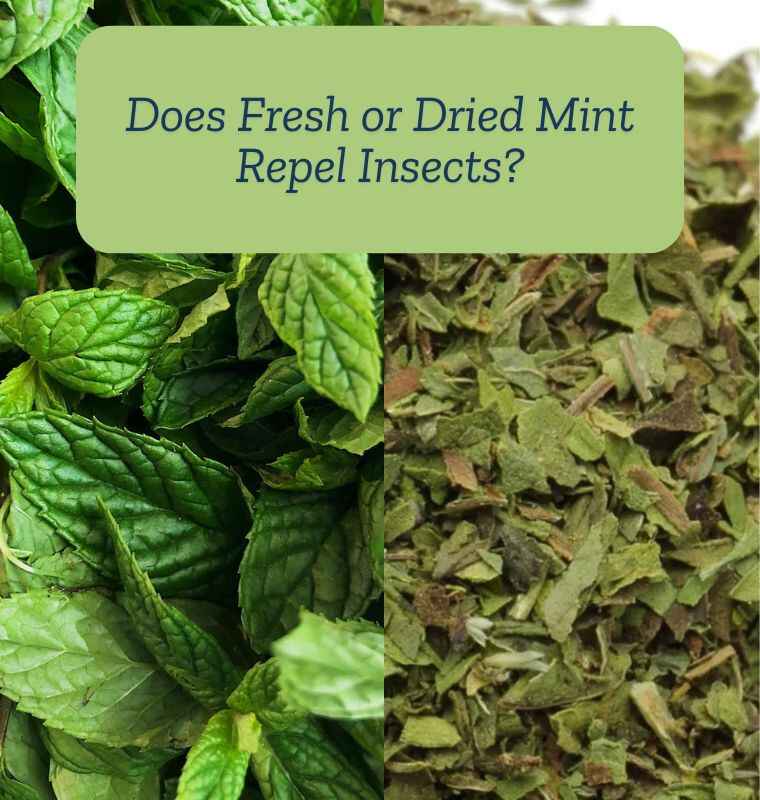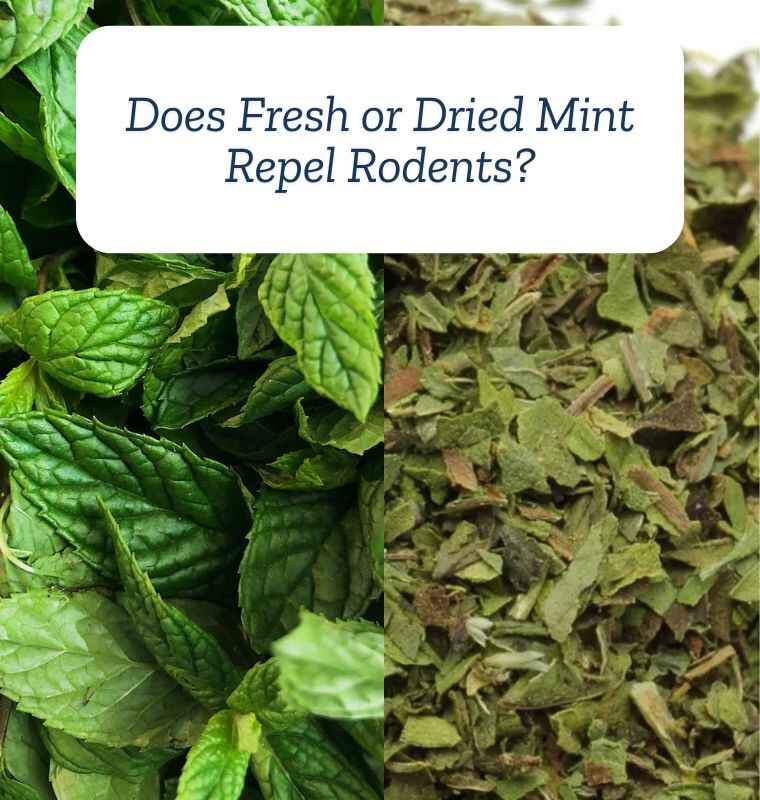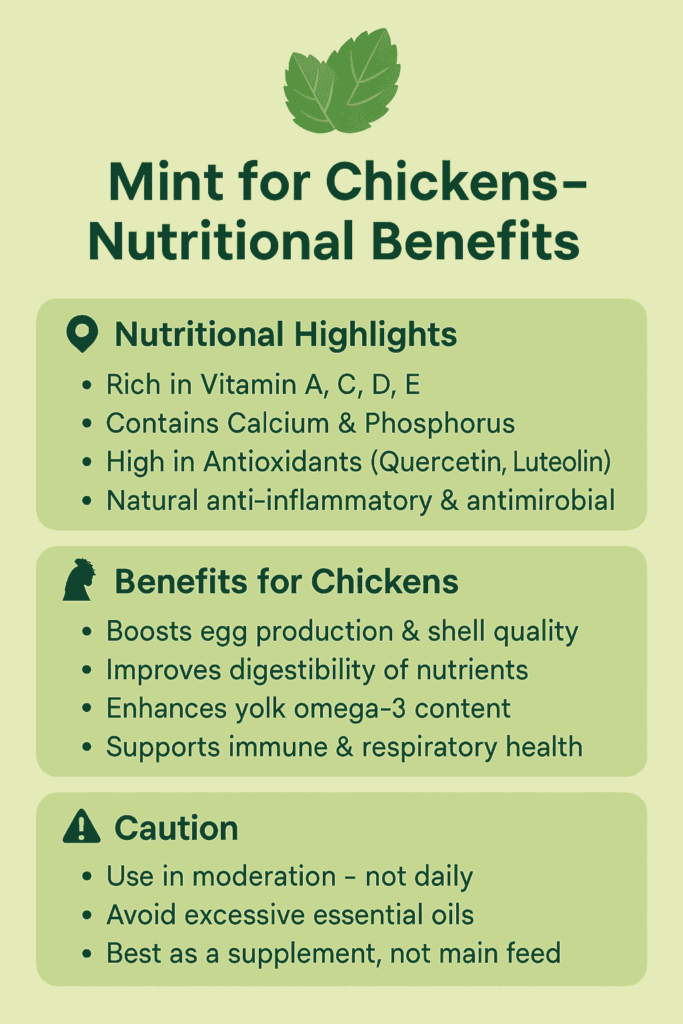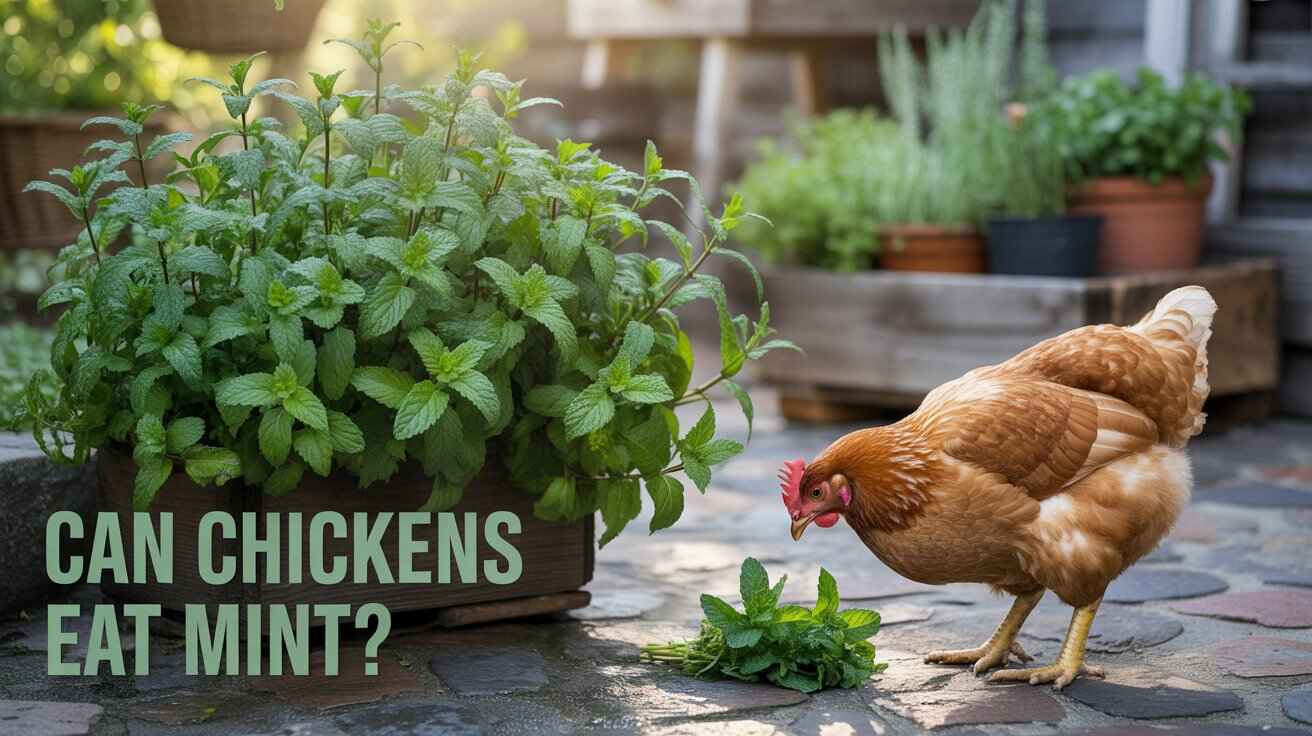Mint is a fascinating plant that has countless uses, from enhancing recipes to offering health benefits. In my experience with backyard chickens, they don’t usually willingly consume strong-smelling herbs like mint.
This may be due to its powerful aroma and taste, which can be overwhelming for their preference. However, mint leaves, especially peppermint and spearmint, contain helpful nutrients like calcium, phosphorus, and vitamins A, C, D, and E, which may support their immune system.
While I wouldn’t rely solely on it as a feed, adding it to a compost bin or tossing crushed mint into their bedding can help keep their space fresh. During the summer, mint’s cool temperature and pleasant scent make it an effective natural deodorizer for your coop.
I’ve also noticed that planting Mentha (the genus of aromatic perennials) near my chicken pen requires care. It’s an invasive plant that thrives in light, moist soil with good drainage, so keeping it in pots can help contain its growth.
If you’re considering planting mint, be mindful that its culinary use is more appreciated by humans, whether in a refreshing Mojito cocktail or a watermelon salad, than by your birds. That said, the occasional interaction with this plant is unlikely to harm your pet chickens, and its presence can enhance the overall environment of your garden.
![]()
Table of Contents
ToggleCan Chickens Eat Mint?
In my experience raising RI reds in Southern California, I’ve noticed that chickens have mixed reactions to the mint family. While some enjoy nibbling on spearmint as a special treat, others avoid it altogether, likely due to its strong-flavored nature.
Adding herbs like sage, thyme, and chives to their diet can enhance their environment, but be cautious with garlic chives and onion bunches, which are less appealing. Interestingly, I’ve seen minty smells linger around the coop after their droppings, though the idea of mint-flavored eggs doesn’t sound too tempting!
Planting ornamentals like chicory fern near chicken pens helps create a chicken-proof zone while doubling as a natural deodorant for the hot weather. And while they might occasionally peck at strawberries, it’s best to grow them far from the dirt they love digging into, as it saves your garden from unnecessary waste.
Does Mint Have a Cooling Effect on Chickens?
Many people believe that mint can help chickens stay cool in hot weather, but the truth is that this is just a Claim. While humans enjoy its refreshing flavor and mouth-feel, chickens, with only 250 taste buds compared to our 10,000 taste buds, can’t perceive the minty sensation we associate with it.
From my experience in the chicken yard, they tend to avoid herbs like mint altogether. Although growing mint is harmless and doesn’t hurt them, it doesn’t have magical cooling properties or lower their body temperature. To truly help them beat the heat, I follow the proven methods shared in this article.

Does Fresh or Dried Mint Repel Insects?
It’s often said that mint, whether fresh or dried, can repel insects like flies, mites, and lice from a chicken coop or yard, but the truth is, this idea doesn’t hold up.
In my experience, planting herbs such as peppermint, rosemary, and lavender around a mint garden or coop adds beauty to the landscaping, but it doesn’t work as an effective pest solution. If it did, we’d see horse barns, dairy farms, and livestock yards full of these plants. However, these places rely on proven insect repellents instead. While your chickens may enjoy the pleasant surroundings, growing mint alone won’t protect them from pests.

Does Fresh or Dried Mint Repel Rodents?
Many believe that mint, especially peppermint, can repel rodents in a chicken yard, but the truth is it’s not effective. Although essential oils like balsam fir or mint oils in high concentrations might offend a determined rodent by interfering with its ability to smell danger, they are impractical and unsafe to use inside a chicken coop.
Such oils can be toxic and even fatal to chickens if ingested. Planted mint also fails to discourage rodents, as shown in an experiment by Herbalist Susan Burek, where a mother mouse used fresh mint leaves to create a cozy nest for her babies. The results of this experiment, shared in a YouTube video, are truly fascinating and demonstrate that mint is no match for persistent pests.
Fresh or Dried Mint – Good for Chicken Immunity?
Adding mint to chicken feed every day might sound beneficial, but the truth is, it can be detrimental to their hen health. As poultry herbalist Susan Burek explains, both fresh herbs and dried herbs should only be used with caution.
Overusing herbs or essential oils can act as destructively as antibiotics, affecting sick chickens and healthy chickens alike. These herbs are helpful for rebuilding core health during illness, but they should be used only for the intended purpose and not indefinitely.
Once the herb fails or core health is restored, it must be discontinued, with an option for infrequent maintenance or shifting to a different health regimen. A credible herbalist would never recommend indiscriminate daily use, as it may act indiscriminately and interfere with their overall well-being.
Uses For Chickens
In my experience, mint has multiple uses for laying hens and maintaining a clean coop. As a Coop Deodorizer, I create an herbal mix with lavender, rosemary, oregano, calendula, lemon balm, and chamomile flowers, which are cut into small pieces, dried in paper bags, and stored in glass jars.
Sprinkling this mix on the shavings in nest boxes helps freshen the environment while keeping pests at bay. The strong-smelling mint is known for its Anti-parasitic properties, as it can repel insects and rodents, while peppermint oil may combat internal parasites like mosquito larvae.
Research has also shown that fresh peppermint leaves or dry peppermint leaves can improve egg quality, including egg weight, egg production, and egg mass, as well as increase feed intake in chickens.
Peppermint oil has antibacterial effects, reducing bacterial counts like Staphylococcus in broiler houses through fogging, improving hygiene standards. It’s also somewhat effective against Eimeria spp., which causes coccidiosis, and has shown Antiviral benefits, such as fighting Newcastle Disease. With so many benefits, adding mint in various forms to your flock’s care routine can support their health and well-being.
Final Thoughts
Mint is an easy-to-grow perennial that offers several practical uses in a coop or pen. While its smells great and can help deter insects and rodents, you’ll need to protect the roots if your flock has access to it, as their digging can damage the plant.
A side benefit is that you can pick a few sprigs to use in your cooking or even to make a refreshing Mojito. Whether for its medicinal properties or its ability to freshen up the environment, planting mint is a versatile and low-maintenance addition to your chicken care routine.




